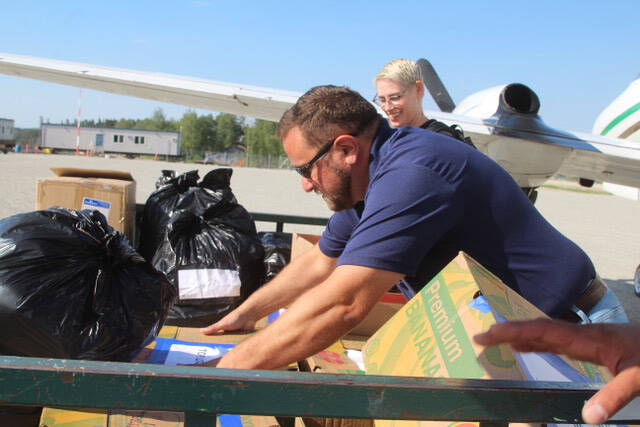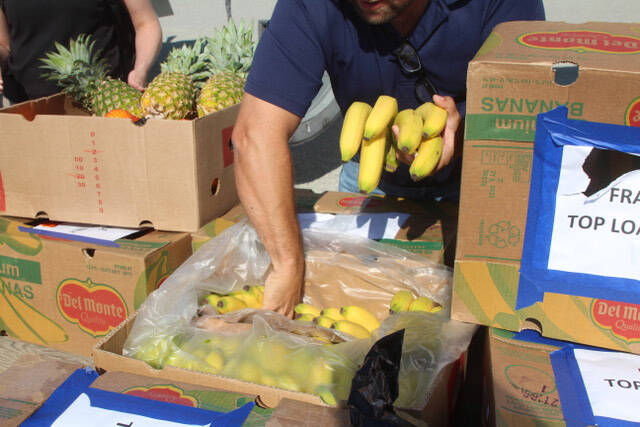Fortifying the nutrition pipeline
Northern communities ‘need more nutritious foods on a timely basis’
Advertisement
Read this article for free:
or
Already have an account? Log in here »
To continue reading, please subscribe:
Monthly Digital Subscription
$0 for the first 4 weeks*
- Enjoy unlimited reading on winnipegfreepress.com
- Read the E-Edition, our digital replica newspaper
- Access News Break, our award-winning app
- Play interactive puzzles
*No charge for 4 weeks then price increases to the regular rate of $19.00 plus GST every four weeks. Offer available to new and qualified returning subscribers only. Cancel any time.
Monthly Digital Subscription
$4.75/week*
- Enjoy unlimited reading on winnipegfreepress.com
- Read the E-Edition, our digital replica newspaper
- Access News Break, our award-winning app
- Play interactive puzzles
*Billed as $19 plus GST every four weeks. Cancel any time.
To continue reading, please subscribe:
Add Free Press access to your Brandon Sun subscription for only an additional
$1 for the first 4 weeks*
*Your next subscription payment will increase by $1.00 and you will be charged $16.99 plus GST for four weeks. After four weeks, your payment will increase to $23.99 plus GST every four weeks.
Read unlimited articles for free today:
or
Already have an account? Log in here »
Hey there, time traveller!
This article was published 18/08/2022 (1211 days ago), so information in it may no longer be current.
ST. THERESA POINT — Food bank leaders gasped as they scanned the aisles of the Northern Store, in sticker-shock over the prospect of spending $29.89 for a plastic container of Folgers coffee, $19.59 for a family-sized box of Cheerios, or $15.39 for a bundle of mandarins.
“How can anyone afford that?” asked Kirstin Beardsley, to no one in particular.
Beardsley, who oversees Food Banks Canada, knew what to expect. The Toronto manager corresponds often with community leaders across the country and is well versed in how food insecurity affects residents from coast to coast.

MAGGIE MACINTOSH / WINNIPEG FREE PRESS
Vince Barletta, CEO of Harvest Manitoba (left) and Jason Stevens, northern program officer for Food Banks Canada, unload food donations for St. Theresa Point First Nation from Winnipeg.
Even still, she said reading price tags for everyday products in St. Theresa Point “hit home” just how challenging it is for residents to eat nutritious meals on a budget.
“Right now, what I feel is a deep sense of responsibility,” said Beardsley, upon landing in Winnipeg after a day trip to the fly-in First Nation. “What are we going to do about it? What actions are we going to take?”
Those are the questions that led Beardsley and colleagues, from both Food Banks Canada and Harvest Manitoba, to plan a visit to the First Nation’s only major grocer in the first place.
On Wednesday, representatives from the charities, in addition to the top boss of Perimeter Aviation, met with Oji-Cree leaders to discuss how their organizations can start serving local residents on a regular basis.
Chief Elvin Flett said food insecurity is a longstanding issue in the growing community, located 500 kilometres from Winnipeg. Inflation has not helped matters.
‘Projects like this, regarding food security are near and dear to us, in terms of the support that we provide and the services we deliver to the communities’– James Lindsey, president and CEO of Perimeter Aviation
Flett said a typical weekly grocery run, which yields two full plastic bags to feed himself, his wife and their grandchildren who stop by for meals, costs between $150 to $175 — a significant increase since this time last year.
Canada’s inflation rate surpassed eight per cent on a year-over-year basis in June. There was a minor dip to 7.9 per cent last month, but the rate remains far from the Bank of Canada’s inflation-control target range of one to three per cent.
St. Theresa Point already runs a nutrition program and is undertaking efforts to harvest more local food to meet community needs. While Flett said free additional groceries will help to patch gaps, the chief indicated there are numerous challenges affecting access to affordable, healthy food.
“We need more nutritious foods on a timely basis and certain types of foods, like grain foods,” Flett said, adding recent shipping delays to the Northern Store resulted in a three-day period without any bread on the shelves.
Members of the community’s chief and council shared numerous food-related concerns, including the rise of health issues related to poor nutrition, such as heart problems and diabetes diagnosis among residents, and how expensive freezers are — and as a result, how many families in the community do not have the appliances they need.

MAGGIE MACINTOSH / WINNIPEG FREE PRESS
St. Theresa Point Chief Elvin Flett says his family’s monthly grocery bill is roughly $600, as a result of fuel surcharges on food shipped to the north and rising inflation.
“Everything comes with a price. A huge price. It’s not just food security — it’s everything,” added the chief.
Income assistance director Rosie Flett, who works with more than 1,000 residents who receive monthly cheques, echoed those comments.
Needy families want basic staples: sugar, flour and baking soda, she said, noting she also requested Harvest Manitoba bring plenty of dry soup mixes Wednesday. “Because they can make soup with ground beef,” she said. “The kids love ground beef.”
Harvest Manitoba and Food Banks Canada are collaborating with leaders to ensure they are meeting the community’s unique food demands. The leaders of both charities are in the process of applying to a federal subsidy program, Nutrition North Canada, with help from Perimeter Aviation, in the hopes they will be able to start shipping produce frequently.
“Projects like this, regarding food security are near and dear to us, in terms of the support that we provide and the services we deliver to the communities,” said James Lindsey, chief executive officer of the airline.

MAGGIE MACINTOSH / WINNIPEG FREE PRESS
Barletta and Kirstin Beardsley, CEO of Food Banks Canada, sort boxes flown in on the Perimeter Airlines flight.
Lindsey said the airline offers sizeable discounts to ship nutritious food donations to any of the 21 remote communities it services. The company, however, has not been exempt from inflationary pressures; a surge in fuel expenses has resulted in a price increase for cargo shipments, as well as fuel surcharges.
Harvest Manitoba’s top leader said the food bank, which rebranded in the fall of 2020 after a decades-long stint as Winnipeg Harvest, is open to addressing northern issues ranging from food supply to appliance infrastructure.
Vince Barletta, chief executive officer, said he wants to offer St. Theresa Point residents the same types of resources that Harvest Manitoba provides to Winnipeggers.
“A brand is more than a name and a logo. It’s a promise that we make to the people that we serve and when we changed our name to Harvest Manitoba, that promise was to try as best as we can to provide the same level of service to all parts of Manitoba, as we have for the past 37 years in the City of Winnipeg,” Barletta said.
“What we learned today is that our traditional ways of running food banks in Winnipeg and other communities may not be the model that works here — and that’s why we need to work with the chief and council.”

MAGGIE MACINTOSH/WINNIPEG FREE PRESS
Canada’s surging inflation rate has further heightened high price tags in St. Theresa Point First Nation.
maggie.macintosh@freepress.mb.ca
Twitter: @macintoshmaggie

MAGGIE MACINTOSH / WINNIPEG FREE PRESS
Fresh fruit is incredibly expensive in northern communities. Barletta unpacks bananas from the donation flight.

Maggie Macintosh reports on education for the Winnipeg Free Press. Funding for the Free Press education reporter comes from the Government of Canada through the Local Journalism Initiative.
Our newsroom depends on a growing audience of readers to power our journalism. If you are not a paid reader, please consider becoming a subscriber.
Our newsroom depends on its audience of readers to power our journalism. Thank you for your support.



